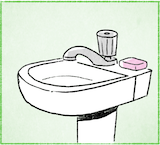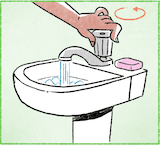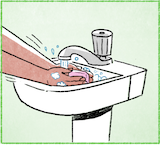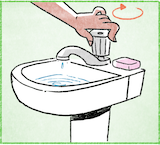




นี้คืออี่หยัง นี้คืออ่างล้างหน้า
อ่างล้างหน้าเป็นแบบใด อ่างล้างหน้าเป็นคืออ่าง
อ่างล้างหน้ามีไว้ถ้าเฮ็ดหญัง อ่างล้างหน้ามีไว้ถ้าล้างหน้า หลือเอาไว้ถ้าล้างมือ
อ่างล้างหน้าสีอี่หยัง อ่างล้างหน้าสีขาว
อ่างล้างหน้าเปิดน้ำได้บ่ เปิดได้อยู่ อ่างล้างหน้ามีก่อกน้ำพ้อม
ก่อกน้ำเอาไว้เฮ็ดหญัง ก่อกน้ำเอาไว้ถ้าเปิด เอาไว้ถ้าปิดน้ำ
ก่อกน้ำหมุนได้บ่ หมุนได้อยู่ ก่อกน้ำหมุนได้
ก่อกน้ำเฮ็ดจากอี่หยัง ก่อกน้ำเฮ็ดจากเหล็ก เฮ็ดไว้เพื่อว่า น้ำสิได้ไหลออกมา
อยู่เทิงอ่างล้างหน้ามีสะบูบ่ มีอยู่ อยู่เทิงอ่างล้างหน้ามีสะบู
สะบูก้อนใหญ่บ่ บ่ สะบูก้อนบ่ใหญ่ สะบูก้อนน้อยๆ
สะบูก้อนสีอี่หยัง สะบูก้อนสีซมพู
สะบูเอาไว้เฮ็ดหญัง สะบูเอาไว้ถ้าล้างหน้า สะบูเอาไว้ถ้าล้างมือ
2
เขากำลังเฮ็ดหญัง เขากำลังหมุนก่อกน้ำ
เขาหมุนก่อกน้ำเฮ็ดหญัง เขาหมุนก่อกน้ำเพื่อว่าเขาสิเปิดน้ำ
เขาสิเปิดน้ำเฮ็ดหญัง บ่ลู้คือกัน เขาอาดสิล้างหน้า หลือเขาอาดสิล้างมือกะได้
เขาหมุนก่อกน้ำแล้ว สิมีน้ำไหลออกมาบ่ ไหลออกมาอยู่ เพาะว่าเขาหมุนเปิดก่อกน้ำ กะสิมีน้ำไหลออกมา
น้ำสิไหลออกมาแต่ใส น้ำสิไหลออกมาจากก่อกน้ำ
น้ำสีอี่หยัง น้ำสีฟ้า
น้ำสิไหลออกมาหลายบ่ หลายอยู่ ขั้นเฮาเปิดน้ำ น้ำกะสิไหลออกมาเลี้ยยๆ
เขาใซ้อี่หยังเปิดก่อกน้ำ เขาใซ้มือของเขาหมุนก่อกน้ำ
3
เขากำลังเฮ็ดหญัง เขากำลังถูสะบู
เขาถูสะบูเฮ็ดหญัง เขาถูสะบูเพื่อว่าสิให้มันมีฟอง
เป็นหญังเขาคือสิเฮ็ดให้มันมีฟอง เขาเฮ็ดให้มันมีฟอง เพาะว่าเขาสิเอาไปล้างมือ หลือเขาสิเอาไปล้างหน้ากะได้
เขาถูสะบูอยู่ใส เขาถูสะบูอยู่ในอ่างล้างหน้า
เขาถูสะบูจักมือ เขาใซ้มือของเขาเทิงสองข้างถูสะบู
4
เขากำลังเฮ็ดหญัง เขากำลังล้างหน้า
เขาล้างหน้าอยู่ใส เขาล้างหน้าอยู่อ่างล้างหน้า
เขาใซ้อี่หยังล้างหน้า เขาใซ้น้ำหลือว่าสะบูล้างหน้า
เขาล้างหน้าจักคน เขาล้างหน้าพุเดียว
เขาเป็นพุหญิงหลือเป็นพุซาย เขาเป็นพุซาย
เขาใส่เสี้ยสีหญัง เขาใส่เสี้ยแขนสั้นสีเหลียง
ตอนนี้เขาเปิดน้ำบ่ เปิดอยู่
คือลู้ว่าเขาเปิดน้ำอยู่ เห็นน้ำมาไหลโจ้นๆ อยู่ กะเลยฮู้ว่าเขาเปิดน้ำอยู่
ตอนนี้เขาเอาน้ำใส่หน้าเขาบ่ เอาใส่อยู่
คือลู้ว่าเขาเอาน้ำใส่หน้าของเขา เห็นหน้า มันฟองออกมาจากหน้าเขา กะเลยฮู้ว่าเขาเอาน้ำใส่หน้า
เขาล้างหน้าโดนบ่ บ่ลู้คือกันว่าเขาล้างหน้าโดนหลือบ่โดน
เขาล้างหน้าเฮ็ดหญัง บ่ลู้คือกันว่าเขาล้างหน้าเฮ็ดหญัง เขาอาดสิบ่อยากให้หน้าเขาสกกะปกกะได้
5
เขากำลังเฮ็ดหญัง เขากำลังหมุนปิดก่อกน้ำ
เป็นหญังเขาคือหมุนปิดก่อกน้ำ เขาอาดจะปิดน้ำ เขากะเลยหมุนปิดก่อกน้ำไว้
เป็นหญังเขาคือปิดน้ำ เขาอาดสิบ่ใซ้น้ำแล้วกะได้ เขากะเลยปิดน้ำไว้
ตอนนี้น้ำมันไหลบ่ บ่ น้ำมันเซาไหลแล้ว
คือลู้ว่าน้ำมันเซาไหลแล้ว กะลู้ เพาะว่ามันบ่มีน้ำไหลออกมาแล้ว
แล้วมีน้ำขังอยู่ในอ่างล้างหน้าบ่ มีอยู่ ตอนนี้มีน้ำขังอยู่เทิงอ่างล้างหน้าอยู่
Link to overview page
Link to dictionary
| Isaan | Pronunciation | Tones | Thai | English/Notes |
|---|---|---|---|---|
| นี้ | ni: | HF | นี้ | 1. this 2. here |
| คือ | khʉ: | HR | คือ | 1. to be, to resemble, like, as 2. why {บักหล้าคือบ่เก็บโต่ะแน่ = [addressing a young boy] Why haven't you cleared the table?} |
| อี่หยัง | i:-yaŋ | H-M | อะไร | 1. what {นี้คืออี่หยัง = What is this?} {มื้อนี้เจ้าเฮ็ดอี่หยัง = What are you doing today?} {กินเข้างายกับอี่หยัง = What did you have for breakfast?} 2. something, anything, (in negations) nothing {บ่ต้องเฮ็ดอี่หยังอีกเลยนอกจากใส่ปุย = [we] don't need to do anything besides adding fertilizer} |
| อ่างล้างหน้า | a:ŋ-la:ŋ-na: | H-HF-LF | อ่างล้างหน้า | sink, washbasin |
| เป็น | pen | M | เป็น | 1. to be, to exist 2. to be able to 3. to suffer, sth. happens to 4. เป็นหญัง[...]คือ in initial position: why? {เป็นหญังเขากะคือแปงฟัน = Why is he brushing his teeth?} {เป็นหญังเคี่ยงบินมันคือสิตก = Why is the airplane falling down?} |
| แบบ | bɛ:p | LF | แบบ | 1. example, model, kind 2. style, form, pattern, design |
| ใด | dai | M | ใด | 1. which, that one which, what, how {เขานั่งแบบใด เขานั่งขดตะหมาดอยู่ = How is he sitting? He's sitting cross-legged.} {ตอนใด = when?} 2. whichever, whoever {หม้องใดหม้องหนึ่ง = some place, somewhere} {ขั้นเฮาอยากตื่นญามใด เฮากะตั้งเวลาปุกญามนั้น = If we want to get up at a certain time, we set the alarm to that time} Notes: sentence-final often with a marked rising tone |
| อ่าง | a:ŋ | H | อ่าง | basin |
| มี | mi: | HR | มี | 1. to have 2. there is |
| ไว้ถ้า | wai-tha: | HF-LF | usually in a positive statement or answer: is for, is used for, has the purpose of {กะทะมีไว้ถ้าทอด = a pan is for frying} {น้ำบักนาวมีไว้ถ้าปุงอาหาน = lime juice is used to season food} {ปากกามีไว้ถ้าเขียน = a pen is for writing} {กะเทียมเอาไว้ถ้าเฮ็ดแนวกิน = garlic is used to make food} {ขาเอาไว้ถ้าญ่าง = legs are for walking} {เกิบเอาไว้ถ้าใส่ = shoes are for wearing} Notes: see also ไว้ |
|
| เฮ็ด | het | H | ทำ | to do, to make |
| หญัง | ɲaŋ | M | อะไร, เป็นหญัง = ทำไม | 1. what {เขากำลังเฮ็ดหญัง = What is he doing?} {ธูปเอาไว้เฮ็ดหญัง = What are incense sticks for?} 2. something, anything, (nothing) 3. เป็นหญัง[...]คือ in initial position: why {เป็นหญังเขาคือใส่บักพิกลงไปในกวยเตียว = Why is he putting chili in [his] noodle soup?} {เป็นหญังหน้าต่างมันคือเปิด = Why is the window open?} {เป็นหญังมันคือมีควนไฟ = Why is there smoke?} |
| ล้าง | la:ŋ | HF | ล้าง | to wash |
| หน้า | na: | LF | หน้า | 1. front {ปะตูหน้า = front door} 2. face {เขากำลังล้างหน้า = he's washing his face} 3. auxiliary: conditional tense {เขาหน้าสิเป็นพุบ่าวพุสาวกัน = they are probably groom and bride} {กะหน้าสิส้มอยู่ = it's likely to be sour} 4. season {หน้าฮ้อน = hot season} 5. page 6. clf. for pages {เฮาอ่านฮอดหน้านั้นแล้ว = we've read until this page} |
| หลือ | lʉ: | M | หรือ | or |
| เอา | ao | M | เอา | to take, to give {เขากำลังเอาก่องไปซั่ง = he's taking the boxes to weigh them} {หมอกำลังเอายาให้คนป่วยกิน = the doctor is giving medicine to the patient} {เอาไว้ถ้า = is for, is used for, has the purpose of} |
| มือ | mʉ: | HR | มือ | 1. hand 2. front leg/paw (e.g., of a cat) |
| สี | si: | M | สี | 1. color 2. colored pencil, crayon |
| ขาว | kha:o | M | ขาว | white |
| เปิด | pə:t | M | เปิด | 1. to open {เปิดหน้าต่าง = to open the window} {เปิดปะตู = to open the door} 2. to start, to switch on {เปิดไฟ = to switch on the light} {เปิดแอ = to switch on the A/C} |
| น้ำ | na:m | HF | น้ำ | 1. water 2. drink, soft drink, juice |
| ได้ | dai | HF | ได้ | 1. can 2. to get, to obtain 3. before verb: indicating past tense 4. บ่ได้ + verb: not |
| บ่ | bɔ: | H | ไม่ | 1. no, not 2. question particle, transforming a statement into a question Notes: spelling exception in line with common usage on social media |
| อยู่ | yu: | H | อยู่ | 1. to be (located) at 2. yet, still 3. auxiliary indicating continuous or progressive action {ทอดปาอยู่ในกะทะ = (in the process of) frying a fish in the pan} {แม่กำลังเมี้ยนเฮียนอยู่ = mother is cleaning/tidying up the house} |
| ก่อกน้ำ | gɔk-na:m | H-HF | ก๊อกน้ำ | tap, faucet |
| พ้อม | phɔ:m | HF | พร้อม | at the same time, also, too {มีตะเว็นพ้อม = the sun's out, too} {กะทะมีด้ามพ้อม = the pan has also a handle} |
| ไว้ | wai | HF | ไว้ | 1. to keep, to put, to place, to retain, to save, to reserve {เขาเอาหัวของเขาไว้ใส = Where does she put her head?} {หมาสิเลี้ยงไว้บ้าน = dogs are kept/raised in the house} {ไก่เลี้ยงไว้ในคอก = chicken are kept/raised in a coop} {หน้ามันบังไว้ = the face is covered/not visible} {เขาเอาโทละสับวางไว้หู = he holds the phone to his ear} 2. for {นาลิกาปุกมีไว้เฮ็ดหญัง = What is an alarm clock for?} {หม้อเอาไว้เฮ็ดแนวกิน = a pot is used to make food} {ก่องเอาไว้เฮ็ดหญัง ก่องเอาไว้ใส่ของ = What is the box for? It's for putting in stuff.} Notes: see also ไว้ถ้า |
| ปิด | pit | M | ปิด | 1. to close {ปิดปะตู = to close the door} {ปิดก่อกน้ำ = to close the tap} 2. to finish, to switch off {ปิดไฟ = to switch off the light} {ปิดวิทะยุ = to switch off the radio} |
| หมุน | mun | M | หมุน | to turn, to rotate {เขากำลังหมุนปิดก่อกน้ำ = he's turning off the tap} {พัดลมหมุน = the fan is running/rotating} |
| จาก | ja:k | LF | จาก | 1. from {... เฮ็ดมาจากอี่หยัง = ... is made from what?} 2. to depart |
| เหล็ก | lek | M | เหล็ก | iron, steel, metal |
| เพื่อ | phʉ:a | H | เพื่อ | for Notes: the vowel เอือ is likely to be a Thai loan; pronunciation: also realized as เพี่ย |
| ว่า | wa: | H | ว่า | 1. that, as {คำว่า X = the word X} 2. to say |
| สิ | si | M | จะ | future tense auxiliary {เขากำลังสิตื่น = he's about to wake up} {สิไปตะหลาด = [I'm] going to the market} |
| ไหล | lai | M | ไหล | to flow |
| ออก | ɔ:k | LF | ออก | 1. to go out, to leave 2. out |
| มา | ma: | HR | มา | 1. to come 2. auxiliary expressing action towards the present or focal time {กะคุเฮ็ดมาจากอี่หยัง = What is the bucket made of?} {แล้วเขากะเก็บเงินจากพุนั้นมา = and then she takes the money of that person} |
| เทิง | thə:ŋ | HR | บน | 1. on, on top of, at, in {เทิงโต่ะ = at/on the table} {กบมันนั่งอยู่เทิงใบบัว = the frog is sitting on the lotus leaf} {เทิงท้องฟ้า = in the sky} {มันแล่นอยู่เทิงลาง = [the train] runs on rails} {มีคนนั่งอยู่เทิงลดสามล้อสามคน = there are three people sitting in the tuk tuk} 2. up, upward Notes: pronunciation: also realized as ทัง |
| สะบู | sa-bu: | M-M | สบู่ | soap |
| ก้อน | gɔ:n | HF | ก้อน | 1. piece, lump, mass, chunk 2. clf. for bars of soap, stones, clouds, ice cubes |
| ใหญ่ | ɲai | H | ใหญ่ | large, big |
| น้อย | nɔ:i | HF | น้อย | 1. few, little 2. small |
| ซมพู | som-phu: | HR-HR | ชมพู | pink |
| เขา | khao | M | เขา | personal pronoun: he, she |
| กำลัง | gam-laŋ | M-HR | กำลัง | auxiliary indicating continuous or progressive action |
| ลู้ | lu: | HF | รู้ | 1. to know 2. to understand Notes: equivalent to ฮู้ |
| คือกัน | khʉ:-gan | HR-M | เหมือนกัน | 1. also, likewise, similarly {ยินดีที่ได้ฮู้จักคือกันคับ = Nice to meet you too!} 2. in negative sentences: either {บ่ลู้คือกัน = I don't know either} {จักคือกัน = I don't know (either)} |
| อาด | a:t | LF | อาจ | 1. might, may, will 2. likely |
| กะ | ga | M | ก็ | 1. then, consequently 2. also |
| แล้ว | lɛ:o | HF | แล้ว | 1. finished 2. already 3. and then, and next (especially แล้วกะ) 4. auxiliary for past tense |
| เพาะว่า | phɔ-wa: | H-H | เพราะว่า | because |
| แต่ใส | tɛ:-sai | H-M | จากไหน | where from? |
| ฟ้า | fa: | HF | ฟ้า | 1. sky {เคี่ยงบินมันกำลังบินขึ้นฟ้า = the airplane is taking off into the sky} 2. color: blue |
| หลาย | la:i | M | เยอะ, มาก | many, much, very |
| ขั้น | khan | LF | เมื่อ | when, if |
| เฮา | hao | HR | เรา | 1. personal pronoun: we 2. personal pronoun: I |
| เลี้ยยๆ | li:ai | HF | เรื่อยๆ | continuously Notes: pronunciation: also realized as เลื้อยๆ |
| ใซ้ | sai | HF | ใช้ | to use |
| ของ | khɔ:ŋ | M | ของ | of, belonging to |
| ถู | thu: | M | ถู | to scrub, to rub, to wipe, to clean |
| ให้ | hai | LF | ให้ | 1. to give {หมอกำลังเอายาให้คนป่วยกิน = the doctor is giving the patient medicine} 2. for 3. to allow, to be allowed |
| มัน | man | HR | มัน | it (also used to refer to people) |
| ฟอง | fɔ:ŋ | HR | ฟอง | 1. bubble 2. foam (soap, beer) |
| ไป | pai | M | ไป | 1. to go 2. auxiliary indicating action extending into the future |
| ใส | sai | M | (ที่)ไหน | 1. where? {สิไปใส = Where are [you] going?} {มาแต่ใส = Where are [you] coming from?} {กะทะอยู่ใส = Where's the pan?} 2. somewhere, anywhere {ใสกะได้ = anywhere, wherever you like} |
| ใน | nai | HR | ใน | in, within |
| จัก | jak | M | จัก | 1. answer to a question: [I] don't know, don't know exactly, [I'm] not sure {พุซายคนนี้เขาเถ้าไป่ จัก จักเถ้าหลือบ่เถ้า เบิ่งบ่ค่อยออก = Is this man here already old? I don't know. I can't see clearly whether he's old or not.} {เขาเว้ากันอยู่ใส จักคือกัน = Where are they talking? I don't know either.} 2. exact(ly), what exactly {จักต้มอี่หยังกะบ่ฮู้ = I don't know what (exactly) he is cooking} {บ่ลู้คือกันจักปาอี่หยัง = I don't know either what kind of fish this is} 3. how much/many? {ต้นไม้มีจักต้น = How many trees are there?} {ตอนนี้จักโมงแล้ว = What time is it now?} {มือของเฮานี้สิมีจักนิ้ว = How many fingers do our hands have?} 4. a bit, a little bit {จักหน่อย/จักหน่อยหนึ่ง = a bit, a little bit} |
| เทิง | thə:ŋ | HR | ทั้ง | 1. up to, all, all of, the whole of, altogether {เขาใส่กางเกงขาสั้นเทิงสองคน = both are wearing short trousers} {เขาเป็นพ่อของลูกเทิงสามคนนี้ = he's the father of these three [children] here} 2. เทิง ... เทิง ...: both ... and ..., ... as well as ... {เทิงมีใบพ้อม เทิงมีเหลียนพ้อม = there are notes as well as coins} Notes: pronunciation: also realized as ทัง |
| สอง | sɔ:ŋ | M | สอง | two |
| ข้าง | kha:ŋ | LF | ข้าง | 1. side {มีหูจับสองข้าง = there are handles on both sides} 2. next to {วางอยู่ข้างๆ ก่องใบใหญ่ = it's placed next to the large box} {เขายืนอยู่ข้างๆ อีกพุหนึ่ง = he's standing next to another person} 3. clf. for body parts which come in pairs (eyes, ears, legs etc.) {เขามีตาสองข้าง = she has two eyes} |
| คน | khon | HR | คน | person, people |
| พุเดียว | phu-di:ao | H-M | คนเดียว | 1. alone, by oneself {เขากำลังยืนอยู่พุเดียว = she's standing by herself} {เขานั่งอยู่พุเดียว = he's sitting by himself} 2. one person |
| พุหญิง | phu-ɲiŋ | H-M | ผู้หญิง | woman, female |
| พุซาย | phu-sa:i | H-HR | ผู้ชาย | man, male |
| ใส่ | sai | H | ใส่ | 1. to put something in/on {เขาใส่บักพิกในกวยเตียวหลาย = he's putting a lot of chili in his noodle soup} {เขาบีบยาสีฟันใส่แปงสีฟัน = he squeezes toothpaste on the toothbrush} {ก่องเอาไว้ใส่ของ = boxes are there to put stuff in} 2. to wear (clothes) {เขาใส่เสี้ยแขนญาว = he's wearing a long-sleeve} 3. directed at {เอิ้นใส่กัน = to call each other/to say to each other} {หมามันเห่าใส่แมว = the dog barks at the cat} {ล้องเพงใส่ไม = to sing into the microphone} {เขากำลังซี้มือไปใส่พุซาย = she's pointing at the man} |
| เสี้ย | si:a | LF | เสื้อ | shirt |
| แขน | khɛ:n | M | แขน | arm |
| สั้น | san | LF | สั้น | short |
| เหลียง | li:aŋ | M | เหลือง | yellow |
| ตอนนี้ | tɔ:n-ni: | M-HF | ตอนนี้ | now |
| เห็น | hen | M | เห็น | to see |
| โจ้น | jo:n | HF | ไหล | to run, to rush |
| เลย | lə:i | HR | เลย | 1. futher on, beyond, past {เข็มน้อยเลยเลขสิบสองไป = the minute hand has passed number twelve} 2. too much 3. at all 4. definitively 5. completely, utterly |
| ฮู้ | hu: | HF | รู้ | 1. to know 2. to understand Notes: equivalent to ลู้ |
| โดน | do:n | M | นาน | time: long |
| อยาก | ya:k | LF | อยาก | to want, to wish |
| สกกะปก | sok-ga-pok | M-M-M | สกปรก | dirty |
| อาดจะ | a:t-ja | LF-M | อาจจะ | 1. may 2. might, maybe Notes: equivalent to อาดสิ |
| เซา | sao | HR | จบ | 1. to stop, to be finished {น้ำมันเซาไหลแล้ว = the water has stopped flowing} {ฝนเซาตกแล้ว = it has stopped raining} {มันสิเซาเสียงดัง = (phone) it stops ringing loudly} 2. to prevent, to hinder 3. to rest {เซาเมี่ยย = to rest} |
| ขัง | khaŋ | M | ขัง | to retain, to keep |